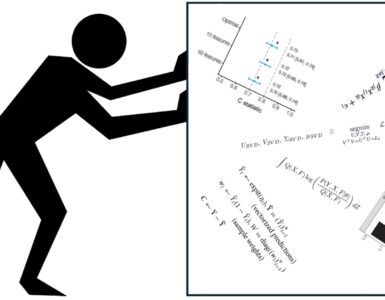I supervised students in several universities and fields, varying from the applied (supply chain management) to the abstract (mathematics). Operations Research is a bit of both. In your courses you have learned a decent amount of maths and programming, yet now you are expected to model a real-world problem and defend the choices you made in the process. I’ve seen students struggle, but do not despair. Here are the tips that I believe you would benefit most from.
1. First things first – or last?
Your thesis starts with an introduction. The goal here is to first explain the relevance of your broader topic. You are free to use references that are not suitable in other sections (newspaper articles, tweets, etc.). It is also good to come up with some numbers that quantify the magnitude or importance of the problem. Then zoom in to your specific research question.
Contrary to popular belief, the introduction is a difficult part to write! I typically recommend writing it last. That said, it is helpful to collect bits of information and references you want to put here along the way. Once you have gathered enough input, talking to people about your work really helps to structure your thoughts.
2. Mind the gap
Remarkably many students have told me they did not include relevant literature because, well: “I didn’t use any of it.” But let me be clear: that is not justification for why your literature review is missing. That’s just a student not recognizing how the literature is relevant.
Most obviously, you can find connections in terms of the application. You may even consider work outside the field of OR and discover that other people look at the same problem with a different mindset. Briefly summarize what they did (one sentence per paper should be enough) and then articulate how it is different from your work. Is there something, however small, that their approach cannot capture, but yours does? That is what we call the gap – filling that gap will be the contribution of your thesis.
Another option is to let your literature review section include a paragraph on methods. This is not so much about explaining the maths behind the method, but about painting the picture around it: Who else used this methodology and for what purpose? Who was the first? What are the recent trends and difficulties in this approach?
3. All models are wrong
Give up on the illusion that you can model reality perfectly. You cannot. On the upside: neither can your supervisor, and perhaps to your surprise, this should not even be your goal. This advice can prove difficult if you are a perfectionist! It may help to keep telling yourself:
All models are wrong, but some are useful.
George Box
Change the question in your head from whether your model is perfect, to whether it is a model that can give useful decision support or insights into the dynamics of the problem. Another good quote:
Everything simple is false. Everything which is complex is unusable.
Paul Valery
In this light, your thesis becomes about finding the sweet spot of difficulty among all approaches, much like Goldie Locks and the three bears. All the effort that goes into thinking and testing whether your problem needs a more difficult solution is not wasted time: this is perfectly valid thesis content.
4. Less is more
If I could get a penny for every lengthy thesis that I had to read! Unfortunately, a wordy thesis is not a good sign. If you can say the same thing with fewer words, that’s better: it shows that you know the essence of your work. That is not to say that writing concisely is easy.
I didn’t have time to write you a short letter, so I wrote you a long one
Abraham Lincoln
Re-read everything multiple times. Whole paragraphs that seemed oh so relevant when you first wrote them, will turn out unnecessary. It may feel counterintuitive to delete text (am I undoing my previous work?) but I promise this is the way to good writing. I have a co-author who yells out “kill your darlings!” every time he does this.
5. Try to enjoy
Remind yourself to enjoy the process. I see students worrying about so many things, but they forget to worry about whether they take any pleasure in their work. You easily spend half a year of your life on this project! Of course, getting a good grade is important. But that is a very result-driven point of view, and it is good to realize that there exist other ways of evaluating success. When it is all done and you look back, I doubt you will be saying “I wish I enjoyed it less”.
Now you know these tips you are one step further towards a well-rounded thesis. Feel free to let me know if they were useful. Also, if you have a piece of thesis advice that is not on this list, but really made the difference for you, share it below!














Add comment